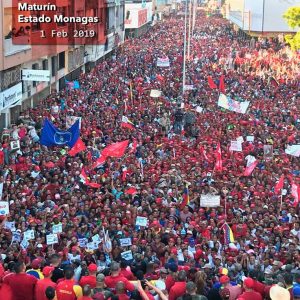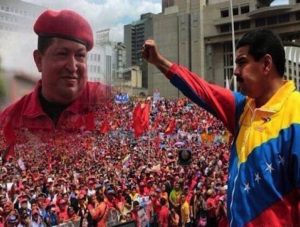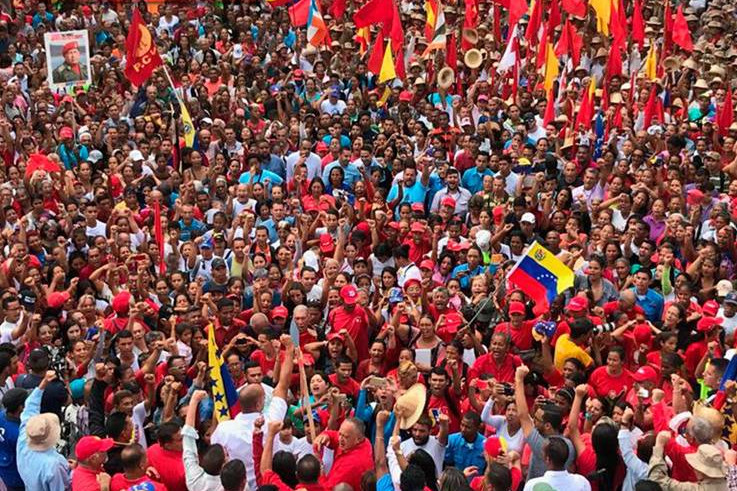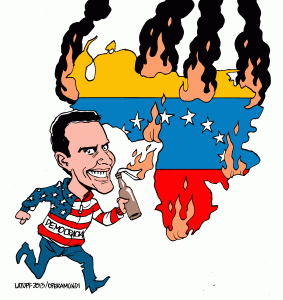Robert Navan
Venezuela-Ireland Network
“Make the economy scream” was Richard Nixon’s instruction to the CIA when the United States decided in 1973 to overthrow the democratically elected government of Salvador Allende in Chile.
Other countries in Latin America have seen democratically elected leaders ousted by the United States or its proxies. Jacobo Árbenz in Guatemala (1954), Jean-Bertrand Aristide in Haïti (2004) and Manuel Zelaya in Honduras (2009) are some examples. There were also several attempts to assassinate Fidel Castro during his time in office.
In 2002 the United States orchestrated an unsuccessful coup against Hugo Chávez. During the brief period when Chávez was removed from office by the plotters and rogue elements among the military, Pedro Carmona, the head of Venezuela’s largest business association, was declared head of a transitional government. He quickly moved to dissolve the National Congress and suspend the constitution of Venezuela.
Throughout these events there were no complaints or shouts from the United States or its allies about democracy. However, many Latin American countries voiced their concern that the coup had forsaken democratic principles, which of course it had.
The scenes that we are witnessing now in our television news are not spontaneous outbursts of dissatisfaction with the government but are the culmination of a process that began in 1999 when Hugo Chávez was first elected president.

Venezuelan elections are probably the most democratic in the world, and are overseen by large delegations of international observers. No less a person than Jimmy Carter, president of the United States from 1977 to 1981, has declared the election process in Venezuela to be the best in the world. In spite of this, successive US governments have refused to recognise the result of any of these elections.
Venezuela has always been portrayed in the media as a far-left regime. Descriptions such as “failed socialist experiment” and “21st-century socialist experiment in ruins” abound. (Interestingly, these articles often come from media mouthpieces for one the biggest economic disasters in world history, the 2008 global financial crisis.) These descriptions say more about the general shift to the right in western mainstream politics and their subservient media. In fact the programme of the United Socialist Party of Venezuela resembles more the radical programme of the post-war Attlee government in Britain; but nowadays supporting the nationalising of key industries, such as coal or oil, a universal health service and affordable public housing are seen as extreme left policies.
Indeed mistakes have probably been made by the Venezuelan government since the beginning of the Bolivarian revolution; but is there a country in the world (including our own) that hasn’t made mistakes, particularly in the area of economics? Not many of them have had to formulate their policies while protecting themselves from the aggression of the most powerful militaristic state in the world.
One of the criticisms from those on the left has been that Chávez should have taken the major food and drinks distributors, such as Polar, into state control and thus avoided the manipulation of food shortages. Polar, Venezuela’s largest private firm, produces the traditional PAN flour used to make arepas, the most popular food in Venezuela. It also owns the largest and best-known brewery in the country.

It does seem that trying to reach accommodation with big business has not worked out. You could say that the social-democratic and not the socialist model has failed in Venezuela.
Another criticism is that not enough investment and effort was made to lessen the country’s dependence on oil, by diversifying into agriculture and food production. Venezuela imports about two-thirds of its food, and this leaves the country very exposed at times like the present.
Venezuela is “screaming,” and the noose is being tightened. It is difficult to see a way out that will not result in an end to democracy and probably the suspension of the constitution. The United States is unlikely to openly commit troops to an invasion, but undercover support for opponents of the elected government is already in place. Proxies such as the Organisation of American States could be used, or possibly a manufactured border incident with Colombia. Such scenarios could give the United States an excuse to intervene militarily.
There are elements in the opposition in Venezuela that are moderate and are willing to work within the democratic structures, but they seem to be led by more extreme elements, who want all gains and traces of the revolution eliminated. Make no mistake, that’s what will happen if the latter get their hands on the reins of power.
Cuba, Bolivia and Nicaragua are next in the cross-hairs of US foreign policy. There have already been parliamentary coups in Brazil, Honduras, and Paraguay. Chile and Argentina have right-wing governments. It’s too early to make a prediction on the future political path of Mexico. Now is a bad time for progressives in Latin America; but the rest of the world doesn’t look great for us either.
The struggle continues!







